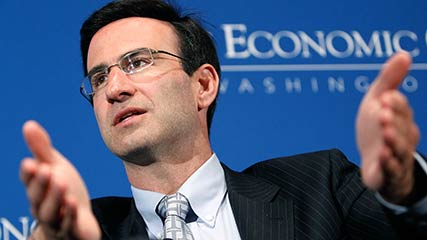White House Agrees to Deal on 'Don't Ask, Don't Tell'
-
WASHINGTON (May 24) – Congress may vote as early as Thursday to repeal the military's "don't ask, don't tell" law on gays after a compromise deal between the White House and Democratic lawmakers cleared the way for action before a Pentagon review is complete in December.
The deal unplugs the bottleneck created a few weeks ago when Defense Secretary Robert Gates urged Congress to go slow on repealing the 1993 Clinton administration policy, in order to give the military time to gauge attitudes within the ranks and to assess the best way to go about implementing any changes. Gay-rights groups complained that violated the intent laid out by President Barack Obama in his State of the Union speech when he said he would work "this year" to repeal the law.

White House budget chief Peter Orszag sent a letter to Democratic lawmakers saying the administration supports a legislative amendment that will step up the repeal of "don't ask, don't tell."
Under the brokered agreement, an amendment to repeal the law this year would be added to the annual must-pass defense spending bill. Last year's defense authorization act was used as a vehicle to pass the nation's first federal civil rights law protecting gays and lesbians against hate crimes.
In a letter to Democratic sponsors of the repeal, White House budget chief Peter Orszag wrote that the administration supports the proposed amendment, which "will allow for completion of the comprehensive review, enable the Department of Defense to assess the results of the review, and ensure that the implementation of the repeal is consistent with standards of military readiness, effectiveness, unit cohesion, recruiting and retention."
The repeal, which would allow gays and lesbians to serve openly without fear of being discharged, would not take effect until the Pentagon's Comprehensive Review Working Group completes its nine-month implementation management study and then only after it is approved by the president, the secretary of defense and the chairman of the Joint Chiefs of Staff.
Rep. Patrick Murphy, the Pennsylvania Democrat and Iraq war veteran who is the lead sponsor in the House, is expected to introduce the measure Tuesday. Speaker of the House Nancy Pelosi, who has spoken out for quick repeal, could bring it to a vote as early as Thursday. House Republican leaders have vowed to oppose lifting the ban.
Armed Services Committee Chairman Carl Levin and Sen. Joseph Lieberman are expected to introduce the repeal in the upper chamber, where it is unclear whether there are enough votes to head off a filibuster. Sen. John McCain, the ranking Republican on the armed services committee, has said he would fight to keep the law as is.
Gay rights groups, which had the wind knocked out of their sails by Gates' earlier caution, hailed the "dramatic breakthrough."
Aubrey Sarvis, head of the Servicemembers Legal Defense Network, said Obama's support and "Secretary Gates' buy-in should ensure a winning vote, but we are not there yet. The votes still need to be worked and counted."
Alexander Nicholson, executive director of Servicemembers United and a former U.S. Army interrogator discharged under "don't ask, don't tell," said, "We have been making the case to White House staff for more than a year now that delayed implementation is realistic, politically viable and the only way to get the defense community on board with repeal, and we are glad to see the community and now the administration and defense leadership finally rally around this option."
While the amendment's passage is far from assured in Congress, its return to the front burner comes as the midterm election campaigns are heating up. Republicans – already confident at gaining seats in November -- are likely to add the hot-button social issue to their list of complaints about the Democratic administration now in charge in Washington. Conservative Democrats also are unlikely to sign on unless they are sure military leaders are on board with any changes.
More than 14,000 gays and lesbians have been discharged from the military since 1994 when the law -- itself a compromise between President Bill Clinton and conservatives in Congress and the Pentagon -- took effect. Gay-rights activists estimate there are about 66,000 gays serving in the military.
-
So it's not a deal to repeal DA, DT, but a deal to possibly repeal it next year, or after some year after that, or never.
Allowing gays to openly serve has not had an effect on any other military, so why do so many people think the US will go into meltdown if they do it as well?!
-
Only one answer possible <–-> RAMPANT HOMOPHOBIA!!!

Please help with participation here:
hXXps://secure3.convio.net/hrc/site/Advocacy?cmd=display&page=UserAction&id=843&autologin=true&utm_source=Convio&utm_medium=email&utm_campaign=Act+now+Congress+to+vote+this+week+on+DADT